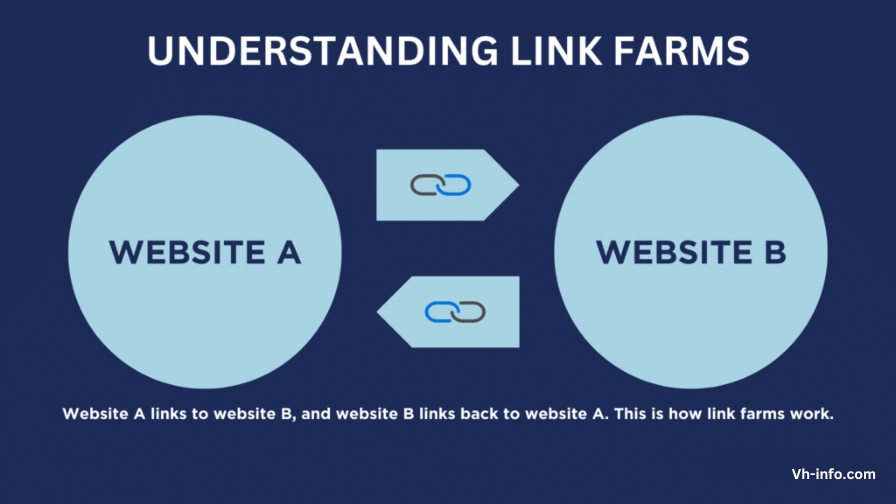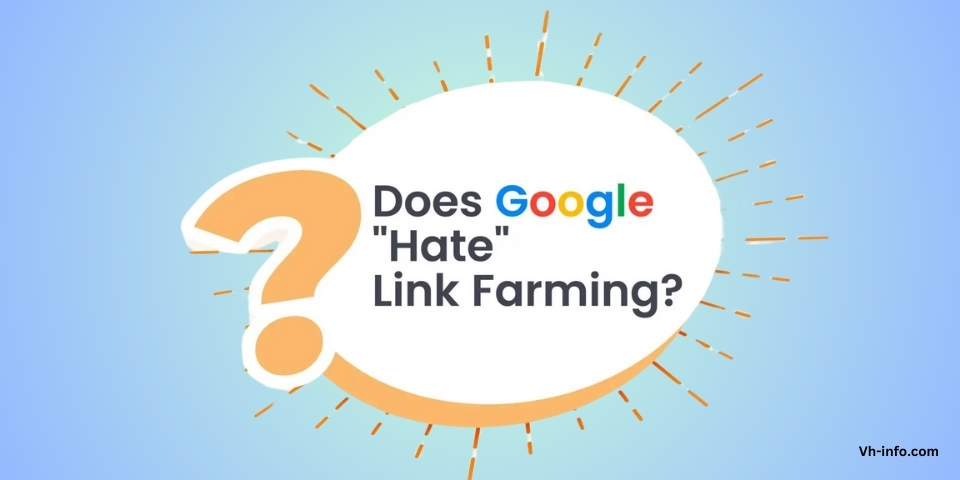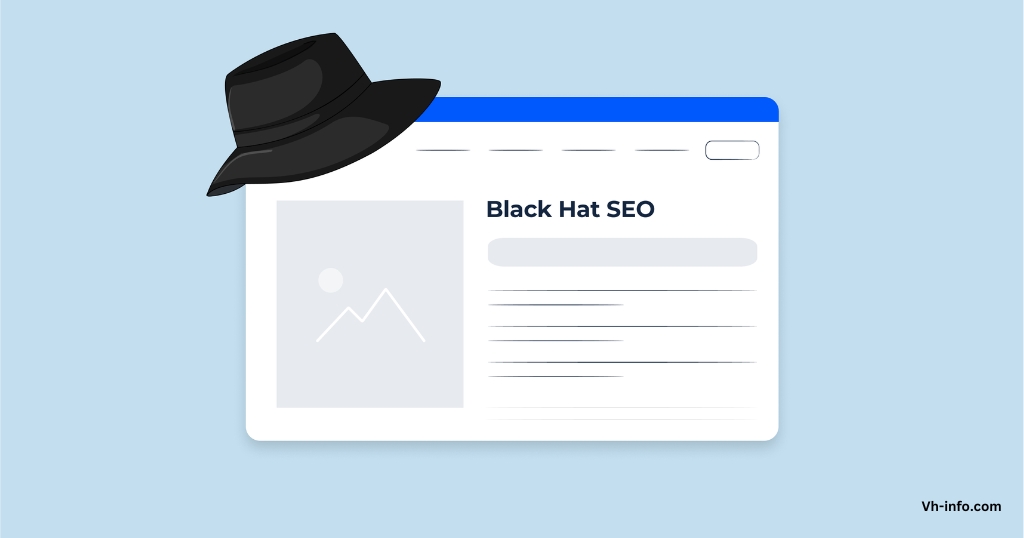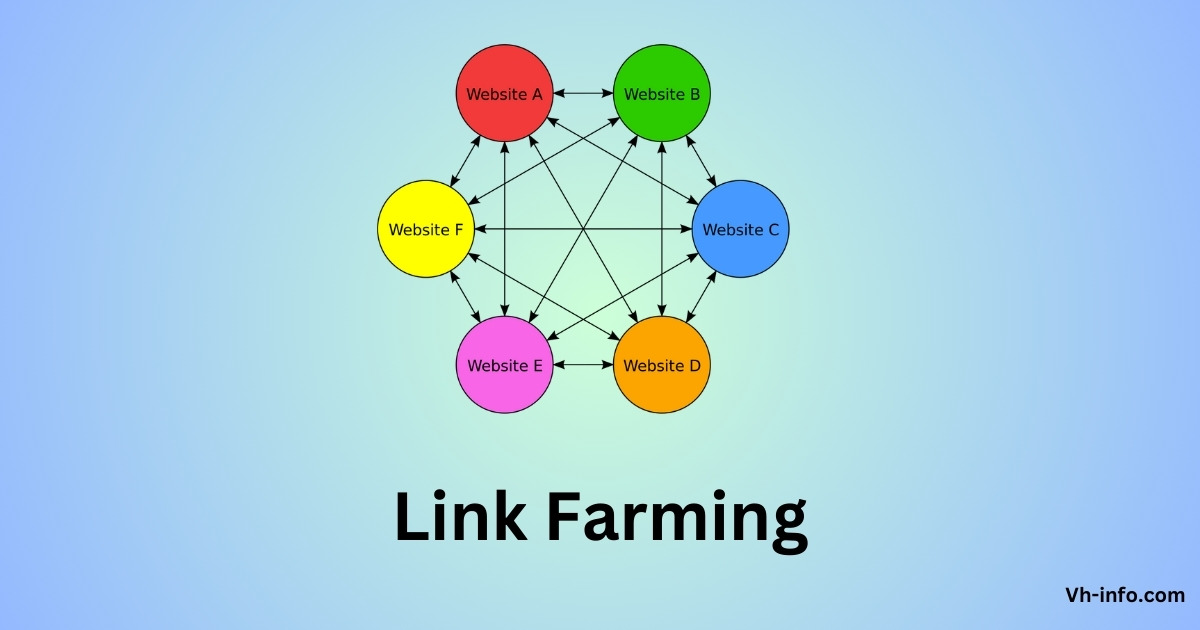Link farming is a controversial and risky black hat SEO technique that aims to manipulate search engine rankings by artificially inflating the number of inbound links to a website.
In this comprehensive guide, we’ll dive deep into what link farms are, how to detect them, why they are considered a spammy tactic, and how to avoid using them as part of your search engine optimization strategy. Instead, we’ll provide tips and strategies for building high-quality links that will improve your search rankings the right way.
As a trusted expert in SaaS link building, VH Info is here to break down this complex topic into clear, actionable insights. We’ll share real examples of link farms, explain how they violate Google’s guidelines, and provide proven alternatives to help you achieve sustainable SEO success without resorting to deceptive methods. Let’s get started!
What Is a Link Farm?

A link farm is a network of websites created with the sole purpose of cross-linking to each other in order to boost their link popularity and PageRank, Google’s ranking algorithm. These interconnected sites typically have little to no valuable content and exist primarily to manipulate search engine algorithms by exploiting the importance of backlinks as a ranking factor. This practice can artificially inflate the number of incoming links to a website, but it is considered a black hat SEO tactic and can result in penalties from search engines.
Brief History of Link Farm
Link farming emerged in the early days of SEO when webmasters discovered that acquiring a large number of inbound links, regardless of their quality or relevance, could significantly impact a site’s search engine rankings. As search engines like Google evolved and refined their algorithms to prioritize quality over quantity, link farms became increasingly viewed as a black hat SEO tactic and an easy way to manipulate search results. This tactic is now heavily penalized and can result in reduced organic traffic and even removal from search engine results.
5 Ways to Detect Link Farms

To protect your website from the risks associated with link farms, it’s crucial to learn how to identify them.
Here are five telltale signs that a site may be part of a link farm network:
1. Evaluate the Overall Quality of a Website
Link farm websites often have thin, low-quality, or duplicate content that offers little value to users. They may also have an excessive number of outbound links and a lack of original, engaging content.
2. Look for “Author” and “About” Information
Legitimate websites typically provide clear information about their authors, owners, or the organization behind the site. If this information is missing or seems suspicious, it could indicate a link farm.
3. Check the Number of Linked Websites
Link farms tend to have an unusually high number of links to other low-quality websites. If a site links out to dozens or hundreds of seemingly unrelated domains, it’s likely part of a link scheme.
4. Check the Anchor Texts
Link farm websites often use keyword-rich anchor texts in their hyperlinks to try to manipulate search rankings for specific terms. If a site has many links with identical or suspiciously optimized anchor text, it may be a link farm.
5. Don’t Let SEO Metrics Trick You
Some link farms may have artificially inflated SEO metrics, such as high Domain Authority (DA) or Page Authority (PA), due to their extensive cross-linking. However, these metrics don’t always reflect the true quality or value of a site.
6. Is it made just to sell links?
Are these websites mostly made to sell links to site owners ? Does the website owner care about the type of site he/she accepts? If the answer is yes to both of these questions, 9 times out of 10 that website is made for use of link builders that want to sell guest posts to make a living.
Does Google “Hate” Link Farming?

Yes, Google strongly disapproves of link farming and considers it a violation of their Webmaster Guidelines. Websites caught participating in link farms risk severe penalties, including a significant drop in search rankings or even complete removal from Google’s index.
Google’s algorithms, such as Penguin and Panda, are designed to identify and penalize websites that engage in manipulative link building practices like link farming. These algorithm updates have made it increasingly difficult for typical link farms to achieve their desired results.
Is a Link Farm a PBN?
A link farm is not necessarily the same as a Private Blog Network (PBN), although there are some similarities. A PBN is a group of websites owned by a single entity, often used to build links to a main “money site.” While PBNs can be used for link farming purposes, not all link farms are PBNs. Private blog networks are a group of websites that people use to bolster the authority of other sites they own, known as member websites. The idea is that it improves their member websites’ search engine rankings.
The key difference is that PBNs are typically designed to appear as legitimate, independent sites, while link farms are more overt (poor quality) in their sole purpose of cross-linking. However, both tactics are considered manipulative and can lead to penalties from search engines. It’s also worth noting that google’s ranking algorithm mostly disregards and in many cases penalizes websites that use link farms and PBNs to manipulate seo rankings.
Why do Link Farms Possess High Domain Authority (DA)?
Link farms often have high Domain Authority (DA) scores because DA is primarily determined by the quantity and quality of inbound links. Since link farms are built around the concept of cross-linking between many websites, they can artificially inflate their DA through this manipulative tactic.
However, it’s important to note that DA is a third-party metric created by Moz, not an official Google ranking factor. While a high DA may make a link farm appear authoritative at first glance, it doesn’t necessarily reflect the site’s true value or ability to positively impact search rankings.
Why is Link Farming a Black Hat SEO Method?

Link farming is considered a black hat SEO method due to its manipulation of search engine algorithms, leading to artificial inflation of website rankings. Engaging in link farming violates search engine guidelines and can result in penalties, harming both the website’s reputation and SEO efforts.
How does Link Farming manipulate PageRank?
Link farming exploits the PageRank algorithm by artificially increasing the number and density of inbound links pointing to a website. PageRank interprets these links as “votes” of popularity and relevance, which can boost the site’s ranking potential. However, since link farm links are not earned naturally, they do not reflect genuine endorsements and can mislead search engines.
How does Private Blog Network help with Link Farming?
Private Blog Networks (PBNs) can be used to facilitate link farming by providing a controlled network of websites that can link to a target site. By owning multiple sites within a PBN, a link farmer can easily create a large number of inbound links from seemingly diverse sources, making the link building appear more natural to search engines.
What is the difference between Link Farm and Content Farm?
While link farms focus on creating networks of interconnected websites to manipulate link popularity, content farms are websites that produce large amounts of low-quality, often keyword-stuffed content to rank for various search queries. Although both tactics aim to game search engine algorithms, link farms prioritize link quantity, while content farms prioritize content quantity over quality.
What is the difference between Link Farm and Click Farm?
Link farms and click farms are different types of manipulative tactics. Link farms focus on creating networks of websites to artificially boost link popularity and search rankings. Click farms, on the other hand, are services that generate fake clicks, views, or interactions on websites, ads, or social media posts to inflate engagement metrics.
Why Should You Avoid Farm Linking?

Participating in link farming schemes can have severe consequences for your website’s SEO and online reputation.
Here are four compelling reasons to steer clear of link farms:
1) Link Farming Invite Penalties
Engaging in link farming puts your website at risk of being penalized by search engines like Google. These penalties can result in a significant drop in rankings, reduced organic traffic, and even complete removal from search results.
2) You Cannot Trust Link Farm Sites
Link farm websites are often unreliable and may disappear or change ownership without notice. Building your link profile on such unstable foundations can lead to broken links and diminished SEO value over time.
3. Your Website Reputation can Suffer
Associating your website with link farms can damage your online reputation and make it difficult to build trust with your target audience. Users may perceive your site as spammy or untrustworthy if they discover your involvement in link farming schemes.
4) Link Farms Site Attracts Poor Traffic Quality
Even if a link farm temporarily boosts your search rankings, the traffic generated from these low-quality sites is unlikely to convert into valuable leads or customers. Focusing on attracting relevant, targeted traffic through legitimate link building methods is a more sustainable approach.
How to Fix Unnatural Links From Link Farm?
If you suspect your website has been involved in link farming, either intentionally or unintentionally, it’s crucial to take action to rectify the situation and prevent further damage.
Here are some steps you can take:
- Conduct a thorough backlink audit to identify low-quality, spammy, or irrelevant links pointing to your site.
- Reach out to webmasters of link farm sites and request removal of the unnatural links.
- If unable to remove the links, use Google’s Disavow Tool to disassociate your site from the harmful links.
- Focus on building high-quality, relevant links from reputable sources to dilute the impact of any remaining link farm links.
- Monitor your backlink profile regularly to ensure no new link farm links appear.
What are Some Alternatives to Link Farms for SEO?
To improve your website’s search engine rankings without resorting to link farms, consider these legitimate and effective link building alternatives:
- Create high-quality, informative content that naturally attracts links from other websites.
- Engage in guest blogging on reputable, industry-relevant sites to build relationships and earn backlinks.
- Participate in online communities, forums, and social media to share your expertise and gain exposure for your website.
- Leverage broken link building by identifying broken links on other websites and offering your content as a replacement.
- Collaborate with influencers or thought leaders in your niche to create valuable content and earn endorsements.
- Conduct link outreach to relevant websites in your niche.
- Optimize your resources page to attract quality backlinks.
- Follow best practices for getting high-quality backlinks the right way.
At VH Info, we specialize in helping SaaS companies implement these white hat link building strategies to achieve sustainable SEO success. Our team of experts can guide you through the process of creating a tailored, effective link building campaign that adheres to search engine guidelines and delivers long-term results.
How Can I Protect My Website from Link Farms?
To safeguard your website from the risks associated with link farms, follow these best practices:
- Regularly monitor your backlink profile using tools like Google Search Console, Ahrefs, or SEMrush to identify and address any suspicious or low-quality links.
- Implement a strict vetting process for any new link building opportunities, ensuring they come from reputable, relevant sources.
- Avoid participating in link exchange schemes or buying links from unknown sources.
- Focus on creating valuable, link-worthy content that attracts natural, high-quality inbound links.
- Stay up-to-date with the latest search engine guidelines and algorithm updates to ensure your link building strategies remain compliant.
FAQ’s:
What is the Purpose of Link Farms?
The purpose of link farms is to artificially inflate the link popularity and search engine rankings of participating websites by creating a dense network of interconnected links. However, this manipulative tactic violates search engine guidelines and can lead to penalties.
Is Link Farm a Form of Private Blog Network (PBN)?
While link farms and Private Blog Networks (PBNs) share some similarities in their goal of manipulating search rankings, they are not exactly the same. PBNs are a group of websites owned by a single entity, often designed to appear as legitimate sites, while link farms are more overt in their sole purpose of cross-linking.
Why is Link Farming Not Effective for Link Building?
Link farming is not an effective link building strategy because it focuses on quantity over quality, violating search engine guidelines in the process. Search engines like Google prioritize natural, high-quality links from relevant and authoritative sources, which link farms fail to provide. Engaging in link farming, while it may seem like a quick and easy way to boost SEO, can actually lead to penalties and diminished search engine optimisation performance.
Is Link Farming Legal?
While link farming itself is not illegal, it does violate the terms of service and guidelines set forth by search engines. Websites caught participating in link farming schemes may face penalties, including reduced search visibility or complete removal from search results.
Is Link Farming a Web Spamming Method?
Yes, link farming is considered a web spamming method because it attempts to manipulate search engine rankings through deceptive and unnatural link building practices. Web spam encompasses various tactics designed to artificially boost a website’s visibility in search results, and link farming falls under this category.
Do Link Spam Farms Work + Are They Good For SEO?
No, link spam farms do not work and are not good for SEO in the long run. While they may temporarily boost search rankings, the gains are usually short-lived and can ultimately lead to severe penalties from search engines. Focusing on earning organic links is the best way to build high-quality, natural links that prioritize user experience and satisfaction, leading to a more sustainable and effective approach to SEO.
What Steps Should I take if my Site has been Penalized for Link Farm Involvement?
If your website has been penalized for link farm involvement, take the following steps:
- Conduct a thorough backlink audit to identify the low-quality, spammy links.
- Attempt to remove the harmful links by contacting the webmasters of the link farm sites.
- Use Google’s Disavow Tool to disassociate your site from any remaining link farm links.
- Focus on building high-quality, relevant links from reputable sources to demonstrate your commitment to ethical SEO practices.
- Monitor your backlink profile regularly to prevent future link farm involvement.
How Can I Safely Improve my Site’s SEO Without Resorting to Link Farms?
To safely improve your website’s SEO without resorting to link farms, focus on these white hat strategies:
- Create high-quality, informative content that naturally attracts links.
- Engage in guest blogging on reputable, industry-relevant sites.
- Participate in online communities and share your expertise.
- Leverage broken link building by offering your content as a replacement for broken links on other sites.
- Collaborate with influencers or thought leaders to create valuable content and earn endorsements.
Remember, sustainable SEO success comes from building genuine, high-quality links that provide value to users and adhere to search engine guidelines.
Conclusion
Link farming is a deceptive and risky black hat SEO tactic that can cause more harm than good to your website’s search engine rankings and online reputation. By understanding what link farms are, how to identify them, and why they should be avoided, you can protect your site from the dangers of these manipulative schemes.
Instead of relying on link farms for quick gains, focus on implementing white hat link building strategies that prioritize quality, relevance, and value. By creating informative content, engaging in guest blogging, participating in online communities, and collaborating with industry influencers, you can build a strong, natural backlink profile that drives sustainable SEO success.
At VH Info, we are committed to helping SaaS companies navigate the complex world of link building and achieve their SEO goals through ethical, effective strategies. Our team of experts can provide the guidance and support you need to develop a customized link building plan that delivers long-term results and keeps your website safe from the risks associated with link farms.



